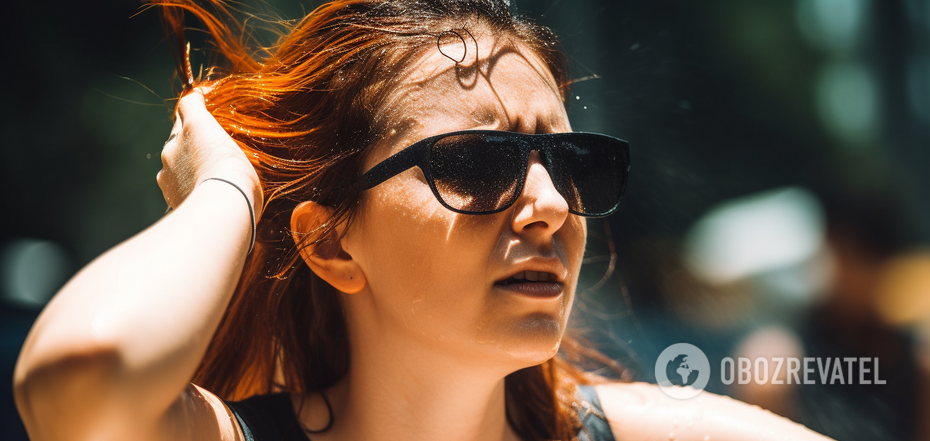News
How to get rid of the feeling of fatigue in the heat and when you need to turn to doctors immediately
The heat makes our energy levels drop because the body has to work harder to maintain homeostasis. You could say that it is the body's desire to maintain the stability of the internal environment despite external factors. Therefore, just being in the heat is enough to tire you out as your body works overtime to cool down, your heart rate increases, and calories are burned faster.
Even if you are not in direct sunlight, there is a risk of heat stroke. OBOZ.UA has collected five tips for those who suffer from the summer heat and reminded how to recognize the warning signs.
How to help yourself in the heat
1. Drink enough fluids
According to the U.S. National Library of Medicine, up to 28% of older adults in the United States are dehydrated. This condition is more than just thirst. Water is constantly needed for the body to function; it is in the blood, its molecules are present in the intercellular space and in every cell of every organ and tissue.
The symptoms of dehydration may seem minor, especially if you are chronically dehydrated and are used to dry lips, fatigue, and headaches. However, severe dehydration is accompanied by serious signs:
- coldness and decreased skin tone, which can turn into blue skin;
- dry mucous membranes, cessation of lacrimal fluid production (in children - crying without tears), decreased saliva production;
- decreased urine production and its intense darkening;
- drop in blood pressure and cerebrospinal fluid pressure;
- convulsions;
- confusion and loss of consciousness.
Therefore, maintaining water balance is something you need to keep an eye on, especially in the heat. When you know you will be outside, it is a good idea to increase your fluid intake to prepare your body for what it will lose through sweat.
Avoid drinking alcohol in the heat as it is a diuretic that exacerbates dehydration.
2. Protect yourself from the sun
Limiting your sun exposure will help you fight fatigue in two ways. First, staying in the shade or indoors can keep your body from overheating, which saves energy. Secondly, your skin will not be under the aggressive influence of ultraviolet rays. Sunburns can also contribute to fatigue because you have to spend energy on repairing damaged cells.
You should wear sunscreen when you go outdoors. The American Academy of Dermatology recommends using SPF 30 or higher and reapplying it every two hours. Even if you are using SPF, it is recommended that you give preference to shade, wear loose clothing and hats that block the sun.
3. Add B vitamins to your diet
B vitamins are essential nutrients that help in the body's functioning, such as moving oxygen around the body and breaking down amino acids. They are also involved in cellular metabolism.
Adding vitamin-rich foods to your diet is an easy way to naturally boost your energy levels. Great sources of B vitamins are leafy greens, Brussels sprouts, eggs, avocados, and whole grains.
4. Take a snack with you
Snacks are your secret weapon in the heat. It will help boost your energy levels and replenish electrolytes and salt that your body loses in high temperatures. It's best to keep your snacks small, light, and nutritious. Fruits and vegetables are full of electrolytes, and nuts and dried fruits are nutritious and good for replenishing energy.
5. Monitor your condition
Heat exhaustion and heat stroke can sneak up on you unnoticed. Therefore, it is better to monitor your health throughout the day and listen to your body.
If you start to feel dizzy or faint, find a cool place to sit and drink water immediately. Putting ice or something cold on your wrists is also an effective way to cool them down as the blood vessels are close to the surface.
How to recognize heat stroke
According to the U.S. Centers for Disease Control and Prevention, a person may lose consciousness or experience slurred speech during heat stroke.
You should also pay attention to earlier and milder signs:
- excessive sweating;
- at first the skin turns red, then becomes dry and hot, and if the condition worsens, cold and clammy;
- frequent weak pulse;
- rapid breathing, shortness of breath, general weakness;
- muscle spasms and pain that can develop into cramps;
- dizziness, darkening of the eyes, visual hallucinations (flashing and flies in front of the eyes, a sense of movement of surrounding objects)
- dyspeptic disorders (nausea, vomiting).
If you experience any of these symptoms, you should try to cool down immediately. If you suspect heat stroke in yourself or your loved ones, you should consult a doctor, and in an acute condition, call an ambulance.
Only verified information is available on OBOZ.UA Telegram channel and Viber. Do not fall for fakes!



























